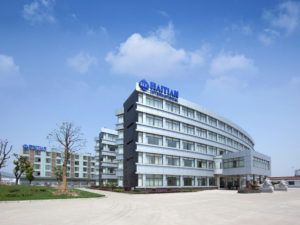Since introduction in 2013, the Haitian two-platen solution Jupiter II Series had an increasing success year by year. Already started in 2014, the two-platen technology machine design was optimized step by step according to customers’ feedback and the market demand. Available clamping forces range starts from 4,500 to 66,000 kN.
The technologically robust new Jupiter II Series is impressive not only because of its rapid, smooth mold movements, and its very economical energy consumption: Because of its compressed design, it is also unbelievably space-saving and in addition it is quiet in operation. The selection of up to 5 injection sizes per clamping unit gives the processor great flexibility. “Because the products and the requirements of many of our customers are very varied so that they have to modify or readjust their manufacturing processes time, flexibility in our design is tailored to address such needs “, Mr. Gao Shiquan, the deputy director of the Technical Department in Ningbo. The new clamping system is precise and easy to handle. Mr. Gao adds “And besides the fact that the Jupiter meets all international requirements, it is not only very comfortable to handle in many respects, for instance in terms of ease of overview and access to the individual areas, but also with regard to maintenance, for example because of the propoer placement of the hydraulics system in the machine base.“
Technology to the Point – Jupiter II Plus for flexible injection molding
In addition to developing the smaller and medium clamping force categories for electrical machines, Haitian International places strategic emphasis quite clearly on its compact two-platen technology in the bigger clamping-force categories. Demand in these sectors is high: In 2015, the sales figures for the Jupiter II Series increased worldwide by around 40% compared to 2014.
Improved clamping unit
The biggest highlight of the Jupiter II Plus is an overall optimization of the clamping unit. The optimized design of the platen increases about 10% more mechanic rigidity, without increasing the weight of the platen, which can effectively reduce the platen deformation during mold close. To achieve significantly shorter dry cycle time, various components have been newly designed, replaced, or optimized. For example, included among the basic changes are the optimized and now significantly faster travelling cylinders (increased mold movement by 5%), as well as new cylinders for the split nut mechanism. Less wear is guaranteed by the contact-free, suspension structure of the tie bar, which helps to reduce the friction and improves the operation efficiency. Four independent clamping cylinders ensure accurate tie-bar positioning and allow precisely regulated adjustment of the mold height. With digital position-sensor system on the platen, the rapid reaction times using CAN bus communication and maximum positioning accuracy (± 0.05 %) is therefore achieved.
With improvement of the rigidity of the clamping unit in general, the service life of the machine has been extended and the operation is even more stable. The optimized injection unit is equipped with a new heater band design, which provides 20% more electrothermal efficiency.
Flexible High-Speed Control System
All Jupiter II Plus Series are equipped with the high-performance KEBA controls (1.4 GHz CPU), which have diverse standard interfaces (CAN, KeNet, KeBus, Sercos, etc.) and can be configured rapidly and easily by a machine operator working comfortably at the LCD color touchscreen (12 or 15 inch), for the widest range of applications.
The Jupiter II Plus also offers more practical functions in terms of the programming; for instance, the way of clamping pressure adjustment can be selected. Consequently it is an approach which can maximize the energy saving while controlling the clamping pressure within a certain range too much. Another additional function is that it offers the operator to re-examine the mold height automatically when the machine restarted.






